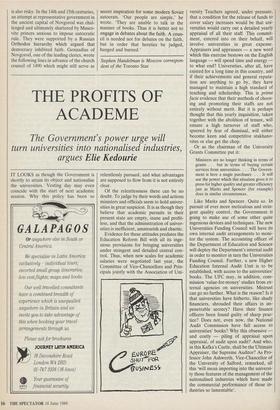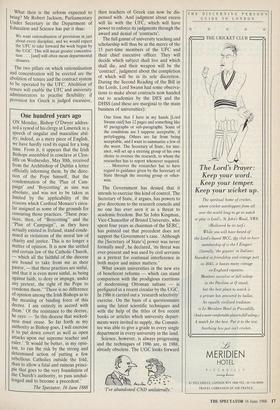THE PROFITS OF ACADEME
The Government's power urge will
IT LOOKS as though the Government is shortly to attain its object and nationalise the universities. Vesting day may even coincide with the start of next academic session. Why this policy has been so
relentlessly pursued, and what advantages are supposed to flow from it is not entirely clear.
Of the relentlessness there can be no doubt. To judge by their words and actions ministers and officials seem to hold univer- sities in great suspicion. It is as though they believe that academic pursuits in their present state are empty, inane and profit- less, and that the administration of univer- sities is inefficient, amateurish and chaotic.
Evidence for these attitudes predates the Education Reform Bill with all its inge- nious provisions for bringing universities under stringent and detailed central con- trol. Thus, when new scales for academic salaries were negotiated last year, the Committee of Vice-Chancellors and Prin- cipals jointly with the Association of Uni-
versity Teachers agreed, under pressure, that a condition for the release of funds to cover salary increases would be that uni- versities would carry out a detailed yearly appraisal of all their staff. This commit- ment, entered into on their behalf, will involve universities in great expense. Appraisers and appraisees — a new word which this exercise bestows on the English language — will spend time and energy to what end? Universities, after all, have existed for a long time in this country, and if their achievements and general reputa- tion are anything to go by, they have managed to maintain a high standard of teaching and scholarship. This is prima facie evidence that their methods of choos- ing and promoting their staffs are not entirely without merit. But it is perhaps thought that this yearly inquisition, taken together with the abolition of tenure, will ensure a high turnover of staff who, spurred by fear of dismissal, will either become keen and competitive stakhano- vites or else get the chop.
Or as the chairman of the University Grants Committee put it:
Ministers are no longer thinking in terms of grants . . . but in terms of buying certain services from universities. . . . The Govern- ment is here a single purchaser. . . . It will use the power which this situation gives it to press for higher quality and greater efficiency just as Marks and Spencer (for example) does in similar circumstances.
Like Marks and Spencer. Quite so. In pursuit of ever more meticulous and strin- gent quality control, the Government is going to make use of some other quite ingenious devices and techniques. The new Universities Funding Council will have its own internal audit arrangements to moni- tor the system. The accounting officer of the Department of Education and Science will deploy the Department's internal audit in order to monitor in turn the Universities Funding Council. Further, a new Higher Education Internal Audit Unit is to be established, with access to the universities' books. The UFC may, in addition, com- mission 'value-for-money' studies from ex- ternal agencies on universities. Mistrust can go no further. What is the reason? Is it that universities have hitherto, like shady financiers, shrouded their affairs in im- penetrable secrecy? Have their finance officers been found guilty of sharp prac- tice? Does not, even now, the National Audit Commission have full access to universities' books? Why this obsessive and costly — piling of appraisal upon appraisal, of audit upon audit? And who, in this Kafka's Castle, shall be the Ultimate Appraiser, the Supreme Auditor? As Pro- fessor John Ashworth, Vice-Chancellor of the University of Salford, remarked, all this 'will mean importing into the universi- ty those features of the management of the nationalised industries which have made the commercial performance of those in- dustries so lamentable'. What then is the reform expected to bring? Mr Robert Jackson, Parliamentary Under Secretary in the Department of Education and Science has put it thus:
We want rationalisation of provisions in just about every discipline, and we would expect the UFC to take forward the work begun by the UGC. This will mean greater concentra- tion . . . [and] will often mean departmental closures.
The two pillars on which rationalisation and concentration will be erected are the abolition of tenure and the contract system to be operated by the UFC. Abolition of tenure will enable the UFC and university administrators to practise flexibility: if provision for Greek is judged excessive, then teachers of Greek can now be dis- pensed with. And judgment about excess will lie with the UFC, which will have power to enforce its judgments through the award and denial of 'contracts'.
The full gamut of university teaching and scholarship will thus be at the mercy of the 15 part-time members of the UFC and their chief executive officer. They will decide which subject shall live and which shall die, and their weapon will be the `contract', judgment about the completion of which will be in its sole discretion. During the Second Reading of the Bill in the Lords, Lord Swann had some observa- tions to make about contracts now handed out to academics by the DES and the DHSS (and these are marginal to the main business of universities):
One form that I have in my hands [Lord Swann said] has 12 pages and something like 45 paragraphs or sub-paragraphs. Some of the conditions are I suppose acceptable, if pettyfogging. Others are far from being acceptable, and I want to summarise a few of the worst. The Secretary of State, for inst- ance, will set up a steering group of his own choice to oversee the research, to whom the researcher has to report whenever required. . . . Moreover the researcher has to have regard to guidance given by the Secretary of State through the steering group or other- wise.
The Government has denied that it intends to exercise this kind of control. The Secretary of State, it argues, has powers to give directions to the research councils and no one has ever seen it as a threat to academic freedom. But Sir John Kingman, Vice-Chancellor of Bristol University, who spent four years as chairman of the SERC, has pointed out that precedent does not support the Government's case. 'Although the [Secretary of State's] power was never formally used', he declared, 'its threat was ever-present and was used by civil servants as a pretext for continual interference in both major and minor matters.'
What awaits universities in the new era of beneficent reforms — which can stand comparison with the prodigious exertions of modernising Ottoman sultans — is prefigured in a recent circular by the UGC. In 1986 it carried out a 'research selectivity' exercise. On the basis of a questionnaire using the latest scientific techniques and with the help of the titles of five recent books or articles which university depart- ments were invited to supply, the Commit- tee was able to give a grade to every single department in every university in the land.
Science, however, is always progressing and the techniques of 1986 are, in 1988, already obsolete. The UGC looks forward `I've abandoned CND unilaterally.' to the UFC using tibliometric techniques' and tibliometric profiling'. These latest scientific techniques will do away with the necessity of universities submitting in- formation about publications. The techni- que itself will evaluate research perform- ance, productivity rates, and even the quality of publications. So new are these techniques that 'bibliometry' appears neither in OED nor in its Supplement. The dictionary, however, lists another word, `bibliomancy', which signifies divination from books. Bibliometry is surely its dis- tant descendant. All this is more like paper-crazy office wallahs in Cairo or New Delhi than sober civil servants in London. Does the Government really wish to force feed universities with this dog's breakfast?




















































 Previous page
Previous page